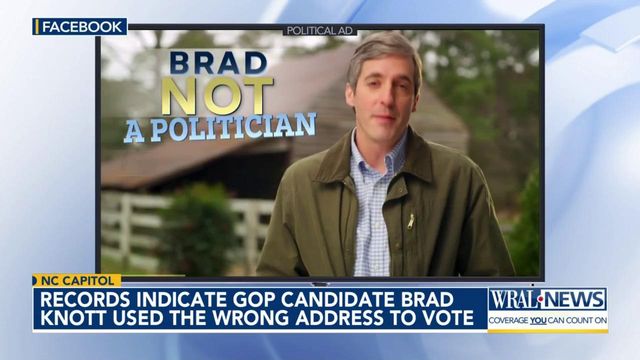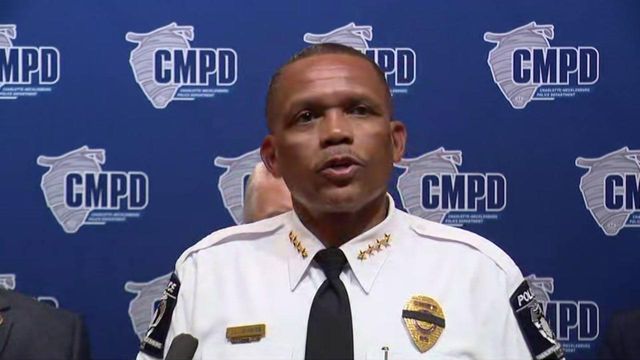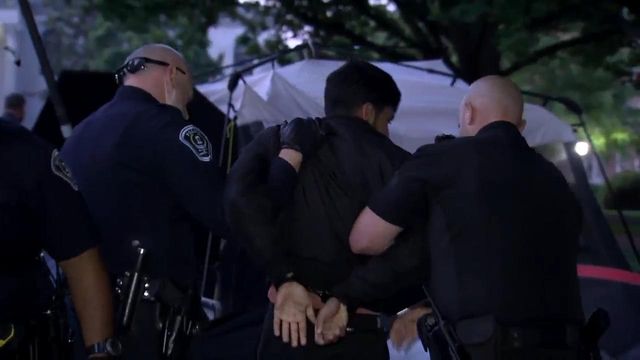A Republican candidate voted from the wrong address. Will it affect his bid for Congress?
A former federal prosecutor who’s running for Congress in North Carolina says he voted in elections while registered at an address where he didn’t live.
Election records show that Brad Knott, who is considered a top contender in the GOP primary in North Carolina’s 13th Congressional District, listed a property on Oberlin Road in Raleigh as his voting address from Nov. 30, 2010, until Nov. 30, 2023. It is Knott’s parents’ address and where he grew up, Knott told WRAL in a phone interview.
In April 2014, Knott purchased a property on Allister Drive in Raleigh, and it had been his residence since 2015 or 2016 — “somewhere in there,” he said. But he didn’t update the address, he said, because it “slipped my mind.”
Records show that since Knott bought his Allister Drive property in 2014, he voted in-person for five general elections while registered to vote at the Oberlin Road address. In a phone interview, he said that his votes didn’t compromise the integrity of any elections.
“It’s a paperwork issue,” he said. “I should have done it when I bought this place, when I moved in. But it’s one of those things where I didn’t do it.”
The situation could provide cannon fodder for his Republican opponents in the hotly contested primary, and it comes at a time when the GOP is laser-focused on election integrity.
It is a violation of the law for a voter to knowingly misrepresent their residential address on a voter registration form or when signing your voting application when you check in to vote. Asked to clarify whether Knott knowingly misrepresented his address, Knott’s campaign didn’t immediately provide a comment.
When North Carolinians vote in person, they are required to share their address with a poll worker and sign a form testifying to their eligibility to vote in the precinct. The form features a disclaimer: “Fraudulently or falsely completing this form is a Class I felony under Chapter 163 of the NC General Statutes.”
A Class I felony can carry a maximum penalty of two years in prison. Knott told WRAL he didn’t remember being asked for his address when he voted at the polls.
“I can’t remember specifically how the ballot exchange happened,” he said. “It was just one of those things where, [the polling site] was where I’d always voted.”
State law provides for a voter challenge process through which a voter can challenge the eligibility of another voter to register or vote in North Carolina. The state and Wake County elections boards haven’t received any challenges to Knott’s ballots, officials for each agency said.
Voter challenges usually precede legal action, said Lorrin Freeman, Wake County’s District Attorney. She didn’t comment on Knott but, in an email, outlined how her office might proceed in cases in which someone is accused of using a wrong address when voting. In some cases, Freeman said, her office might only issue a verbal warning.
“It generally can be difficult to prove that the individual did not have some basis to believe they could be considered a resident of the address they used to vote,” she said.
If an elections board finds the voter had no basis to claim the residence “and the conduct was persistent, then a criminal investigation may be appropriate,” Freeman said.
Battle for nomination
More than a dozen Republicans are competing for the party’s nomination in the 13th Congressional District, which curls around Wake County’s eastern and southern suburbs. The district’s GOP primary is considered a springboard to Washington after state lawmakers redrew the congressional election map last year and gave Republicans an advantage in the district.
Knott, 37, is a political newcomer who says his years as a federal prosecutor make him uniquely qualified to address crime and immigration issues in Washington. Republican political insiders believe he’s among four candidates who can emerge from the field and win the seat.
Currently, the Oberlin home and the Allister home are located in separate judicial districts and have different district representatives on the Wake County Board of Commissioners.
Knott noted that both houses are in the same congressional district, about three miles away from each other. They are also in the same legislative districts. Knott added that, even after he bought his house on Allister, he lived with his parents and his in-laws “for extended periods of time” around the time he got married and when they renovated their house.
“When I moved back with my parents during renovations, should I have filed it back? Maybe so. When I moved in with my in-laws after I got married for a few months, should I have filed it there? Maybe so,” Knott said. “But, you know, we missed it. We will acknowledge that.”
Knott said he would rather spend his time on the campaign trail talking about crime, border security, and immigration policy. He added, though, that he’s happy to explain his voter registration to skeptics.
Similar cases
Voters are often late to change the address on their voter registration after they move — and some candidates have faced scrutiny. In 2022, a watchdog group accused a Georgia Congressman of “undermining the electoral process” because he voted while listing his address at a property that he had sold earlier in the year.
In 2020, a Democrat who won a judicial race in Wake County was deemed ineligible to take office because he didn’t live at the address on his voter registration. The candidate, Tim Gunther, listed his ex-wife’s Fuquay-Varina house as his own, despite living in Cary. Gunther intended to move to the district but said the coronavirus pandemic disrupted his plans, WRAL reported.
People who vote from the wrong address can face legal or professional repercussions.
The North Carolina Bar Association placed a two-year suspension on Gunther’s law license because he misrepresented his address.
Former U.S. Rep. Steve Watkins, R-Kansas, was accused of voting illegally in a 2019 municipal election and initially faced felony charges. He later entered a diversion program to avoid trial.
In 2022, a candidate for Wisconsin Attorney General filed charges against five voters who listed a UPS store as their voting address. Some defendants told Wisconsin Watch, a nonprofit news agency, that they didn’t know state law required voters to list residential addresses.
Affecting the race?
In a race where other top GOP candidates are comparing their conservative bona fides, Knott’s voting history could repel those concerned about election integrity.
Speaking to WRAL, Knott said voter fraud is a serious issue but that voting from an old address is far less consequential than someone impersonating a voter or tampering with a ballot.
Knott also noted that other Republican primary contenders are running with what he called “factual negatives.”
Critics of Kelly Daughtry, a Johnston County lawyer, have aired attack ads suggesting she’s not a true conservative because she donated to the campaigns of Democratic Attorney General Josh Stein and former U.S. Senate candidate Cheri Beasley. Aimee Mulligan, an adviser for Daughtry’s campaign, said the Daughtry has also “given tens of thousands of dollars to conservative Republicans,” including Lt. Gov. Mark Robinson’s gubernatorial campaign.
Businessman Fred Von Canon in 2007 faced a misdemeanor charge for failing to pay income taxes. “He’s got a mugshot,” Knott said. On Feb. 20, Von Canon posted a YouTube video in response to the attacks, saying he’d paid the overdue taxes and doesn’t “owe the IRS a dime.”
Von Canon campaign spokesman Charles Hellwig told WRAL “all Fred’s taxes are paid, period,” adding: “I’m not sure what that has to do with Brad Knott’s voting history.”
DeVan Barbour, who finished second in the 2022 GOP primary for the seat, is also involved in a scandal. Ronald Johnson, a former Smithfield police officer and fellow Republican politician, claimed to have a recording with content that might damage Barbour’s reputation. Barbour previously told WRAL that he’s not worried about Johnson, who was charged with multiple crimes last year over his interactions with Barbour, including extortion.
Knott said he welcomes questions about his voting history, even though he doesn’t consider it a top issue.
“I know that this stuff comes up,” Knott said about potentially facing attacks on the campaign trail. “I know this stuff is all part of politics. And that's part of this process that I really hate.”













